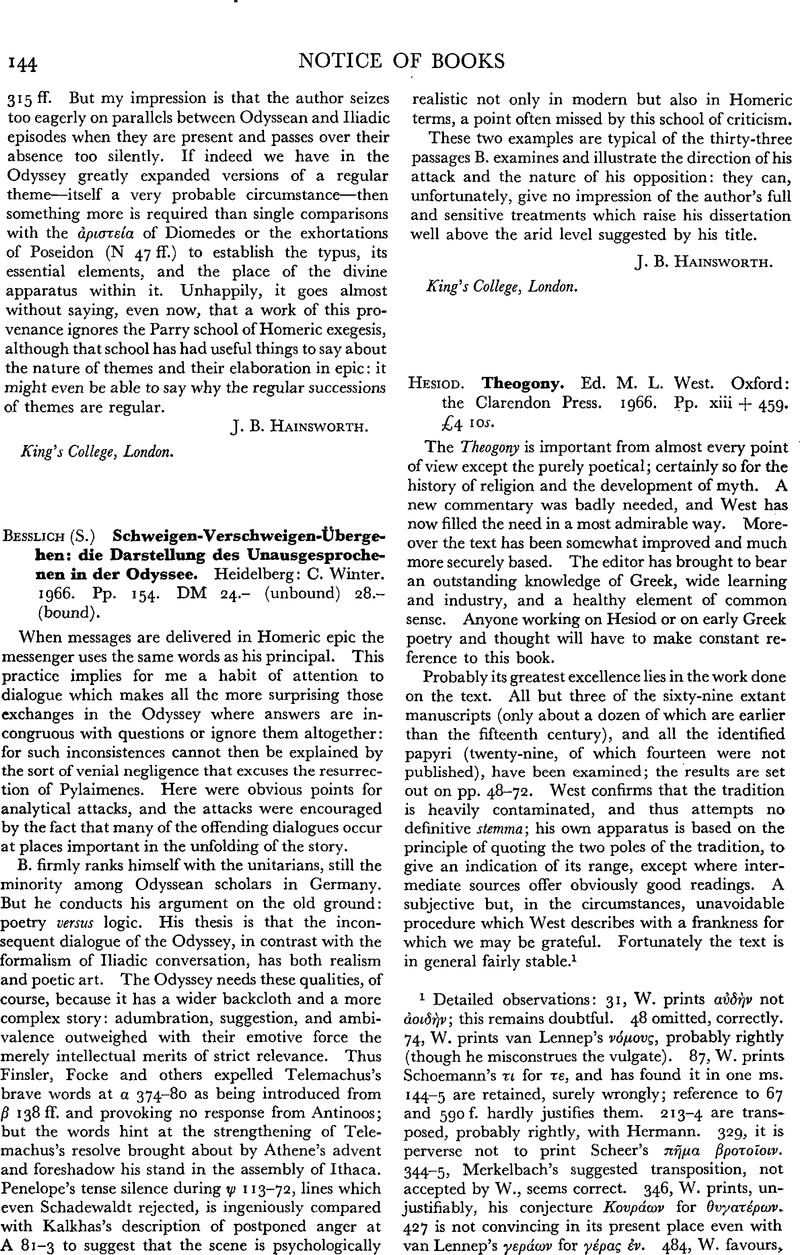Published online by Cambridge University Press: 23 December 2013

1 Detailed observations: 31, W. prints αὐδὴν not ἀοιδὴν; this remains doubtful. 48 omitted, correctly. 74, W. prints van Lennep's νόμους, probably rightly (though he misconstrues the vulgate). 87, W. prints Schoemann's τι for τε, and has found it in one ms. 144–5 are retained, surely wrongly; reference to 67 and 590 f. hardly justifies them. 213–4 are transposed, probably rightly, with Hermann. 329, it is perverse not to print Scheer's ![]() 344–5, Merkelbach's suggested transposition, not accepted by W., seems correct. 346, W. prints, unjustifiably, his conjecture Κουράων for θυγατερων 427 is not convincing in its present place even with van Lennep's γεράων for γέρας ἐν. 484, W. favours, but fortunately does not print in the text, Frobenius' Ἀργαίῳ for Αἰγαίῳ. 540, W.'s τοῖς for τῷ is surely right. 564 is correctly retained. 597, W. prints † ἠμάτιαι, prudently, but Goettling's ἀκάμαται is very likely right. 609, the admitted difficulty of άῶνος calls for a crux. 642 is bracketed as an interpolation, quite unnecessarily. 661, πρόφρονι θυμῷ, suggested by one papyrus, is printed for vulgate
344–5, Merkelbach's suggested transposition, not accepted by W., seems correct. 346, W. prints, unjustifiably, his conjecture Κουράων for θυγατερων 427 is not convincing in its present place even with van Lennep's γεράων for γέρας ἐν. 484, W. favours, but fortunately does not print in the text, Frobenius' Ἀργαίῳ for Αἰγαίῳ. 540, W.'s τοῖς for τῷ is surely right. 564 is correctly retained. 597, W. prints † ἠμάτιαι, prudently, but Goettling's ἀκάμαται is very likely right. 609, the admitted difficulty of άῶνος calls for a crux. 642 is bracketed as an interpolation, quite unnecessarily. 661, πρόφρονι θυμῷ, suggested by one papyrus, is printed for vulgate ![]() a hard choice, but W. may well be right in view of the state of the tradition. 697, Naber's αἰθέρα for vulgate ἠέρα is rightly accepted; so 742, Wakefield's, πρὸ θύελλα θνέλλης. 781Google Scholar, W. cautiously prints † ἀγγελίη, though ἀγγελίην seems highly probable; so 804, † εἰρέας and Hermann's, εἴρας ἐς. 826Google Scholar, W.'s conjecture
a hard choice, but W. may well be right in view of the state of the tradition. 697, Naber's αἰθέρα for vulgate ἠέρα is rightly accepted; so 742, Wakefield's, πρὸ θύελλα θνέλλης. 781Google Scholar, W. cautiously prints † ἀγγελίη, though ἀγγελίην seems highly probable; so 804, † εἰρέας and Hermann's, εἴρας ἐς. 826Google Scholar, W.'s conjecture ![]() though possible, is hardly justified in the text.
though possible, is hardly justified in the text.